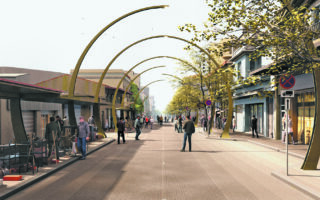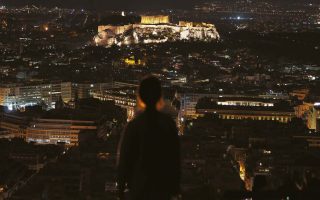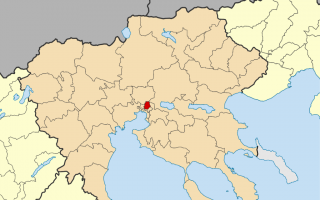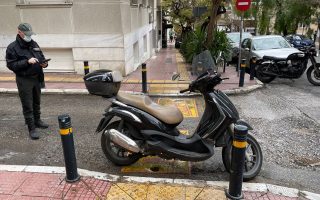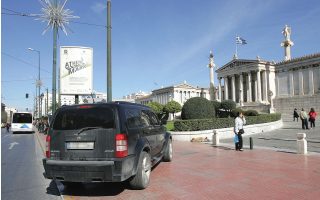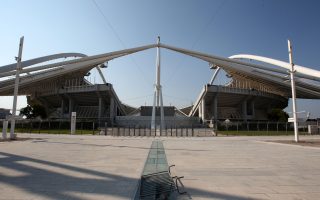Lessons for Greece on urban ‘touristification’
Josep Bohigas, director of the Barcelona Regional Strategic Planning Agency, offers tips to Athens about addressing housing problems
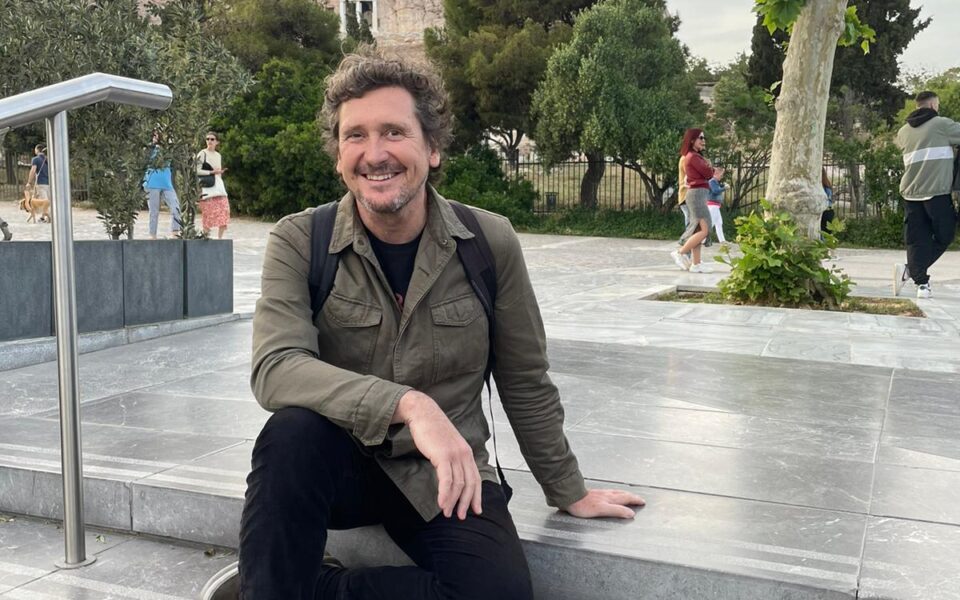
To most Europeans, Barcelona is, quite understandably, one of the prettiest – if not the prettiest – large cities on the continent. However, behind its impressive facade lies a difficult reality for its inhabitants. Excessive tourism and the reclassification of its buildings into “investable assets” has created great difficulties for Barcelonans looking to buy a home, which in turn could lead to social turmoil. The Spanish capital however is skilled at reinventing itself. Today, it is at the forefront of large cities promoting measures against short-term rentals and hotels, in favor of social housing and the creation of public spaces while reducing car usage.
Josep Bohigas, director of the Barcelona Regional Strategic Planning Agency, traveled to Greece recently as a guest of the Schwarz Foundation and gave a lecture at the National Technical University of Athens dispelling the myths and analyzing the solutions that are already being implemented. The architect and city planner, the son of the late Oriol Bohigas – the master planner of the successful 1992 Olympics in Barcelona – is a man that does not hold any misconceptions.
In this interview with Kathimerini, Bohigas presents the reality experienced in Barcelona and the common problems faced by all European cities and explains how municipal authorities need to prioritize the interests of their inhabitants. He also reveals what impressed him in Athens and what advice he has for the mayor of the Greek capital.
“We cannot allow the tourist industry to take over our cities, cars to take up so much public space. Athens urgently needs to take measures, especially for housing,” he says.
In our eyes, Barcelona is the example of a city that managed to take advantage of the 1992 Olympics and reinvent itself as a global destination. How true is that?
When the dictatorship fell, the city didn’t have any public spaces (they existed, but it was forbidden to gather), had no urban story, it was like we didn’t exist. So all our effort in the 80s was concentrated on public spaces, to create our own agora for democracy. We rediscovered the city center, took care of our monuments, created new public spaces. There strategies continued for the preparation of the 1992 Olympic Games. Four areas were chosen, which were used to transform the city, to open it to the sea and the two mountains near it. When the Olympics came, we were all very proud of the result. At the Opening Ceremony, Barcelona said “Hola” to the world, everyone said, “Well, this is a nice city to visit,” and everyone starting talking about “the Barcelona model.”
What changed after that?
Everything was very well planned and soon the Olympic venues adapted to city life. But after the Games, a different phase began. Our politicians and architects said we needed a bigger international airport, more hotels, more investors to keep our city growing. Since there was no money, we started selling to the private sector. We sold our success to whoever had the money. Starchitects were given special permissions to built enormous buildings. Shopping malls and apartment buildings that had nothing to do with the city’s past were created. We started to “lose” parts of our city. The people of Barcelona avoid La Rambla because it is too crowded. Barceloneta was gentrified, our port was sold to nightclubs, a wave of investments started to push people out of their city. We thought that if we became a global city, we would have a wonderful life. Instead, we became the scenery for investment.
That seems to be a problem faced by many big cities.
Yes, for example, behind Tate Modern there are five apartment buildings. They are furnished but empty. They have become an asset, changing owners but no one lives there. The same thing is happening around Central Park in New York, and in parts of Barcelona. This is a global phenomenon. There is a dark market of real estate that buys and sells houses to investors, that don’t even know where the houses are and have their money in tax paradises. To them, houses are a place to put the money in, not live. Recently, our mayor, together with the mayors of London and Paris, went to the UN to talk about the phenomenon. Cities must get together and fight like a network.
Suddenly housing is a problem in most European cities. What impact did the pandemic have?
Office spaces are not attractive to investors anymore. The real estate market is interested in housing.
What is the biggest problem in Barcelona today?
In the 80s and 90s we invested in public spaces and hoped for a “positive metastasis.” That when you clean a public space, people will go there and start noticing the buildings around – at the beginning the facades and then the interior. This didn’t happen, unfortunately. We stayed at the facades and didn’t go further. If the city was a paella, housing is the rice. We took care of the shrimp, the meat, but not the rice. Inside our building lies a hidden problem – the quality of the houses, their cost compared to the people’s income, the lack of accessible housing.
‘I am not sure if Athens is prepared to walk and whether transport can support such an urban intervention’ as the Superblock
How is Barcelona trying to deal with the problem?
We created a strategy with people at the center, which has many layers, like health, housing, work. We created an observatory which allowed us to understand what was happening, to quantify the problem. How many empty buildings there were, how difficult it was for the people to pay rent, what the houses were like in terms of quality and dignity. Then we introduced new policies.
In which direction?
Our data showed that this could not be solved with one solution only, so we created different programs. For instance, for touristification we created a program, the “Special Plan for Tourist Accommodation,” which regulates Airbnb and hotels. There must be control of the market – I was walking around Omonia Square in Athens and found out that 40 hotels are built or planned around it. This is madness! Another step was regulating the rents. We created a platform to help the government change the legislation, so that we stop abusive rents. There is also another law called “30%.” We oblige anyone who restores a whole building to dedicate 30% of the space to affordable housing. We took measures against companies that kept houses empty, waiting for the prices to rise. At the same time there is a housing project, either building new social housing or buying old buildings to offer as affordable housing. We are also helping the homeless, people that were evicted, by providing them shelter in containers in the center of the city. There are a lot of initiatives together with the private sector. For example, a company called 3rd Sector takes empty apartments, restores them and rents them out for five years at affordable prices before returning them to their owners.
Is it your first time in Greece? What have you noticed in Athens as a planner?
My first time in Greece was about 15 years ago, for a school trip on Spetses island – that was a dream. I have visited Athens twice, for lectures. I don’t have deep knowledge of the city, so I will give you my impression. Athens feels very familiar. In every corner you recognize things that we also worry about, like density, conflict, energy. I think it is obvious that in Barcelona we are ahead in transport, but not long ago we were like Athens. Maybe here the problem is more stressing because the presence of cars is more concentrated in some places. I also noticed a lot of tourist infrastructure but no houses. Athens is a beautiful city that nobody lives in.
What would you suggest to the mayor of Athens?
To act in a way to stop people being kicked out of their houses. To do so, he must try to deal with the complexity of this issue. In a dense center you need kids and families, not only tourists. Tourism is not the problem, tourists are not evil. The problem lies in the tourist industry. After Covid, we now face an energy crisis. Maybe in the next few years people will not be able to travel as extensively as today. If the economy of a city is based only on tourism, it will undergo a devastating shock.
Can you explain the concept of Superblocks?
In Barcelona, cars have a 30% share of all transport but take 70% of public spaces. This is unfair. We started creating public spaces called Superblocks. Each one is an area of urban land bounded by arterial road as a shared-use space. It is an easy and cheap way to create precious new spaces. We currently have three pilot projects.
How did the public react?
It is a very radical idea, so some people were in favor and some against. A year after, every neighborhood wants to have their own Superblock. They have no cars, less noise and polluted air. It starts a new life.
Could something similar work in Athens?
During my short stay, I didn’t see people with bicycles, child carriers, wheelchairs. I am not sure if Athens is prepared to walk and whether transport can support such an urban intervention.
You have said that in the coming years, Barcelona must forget it has a sandy beach and redesign the coastline. Why is that necessary?
In urban planning, we must move from the age of sustainability to the age of resilience. It sounds ironic, but Spain, as well as Greece, once advertised itself though the motto “sea, sun and sand.” Now the sea takes the sand away and we will not be able to afford to keep it forever. We must also invent shade and another way to relate to the sea other than the beach. We must accept that the changes are here and build new solutions.
